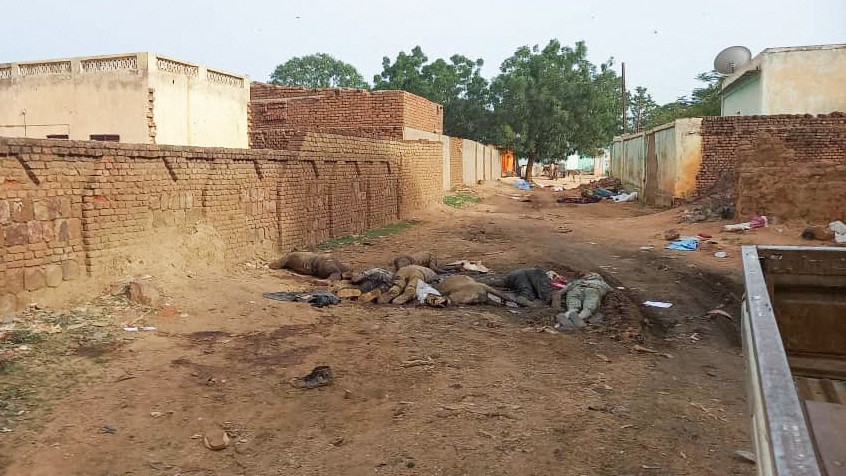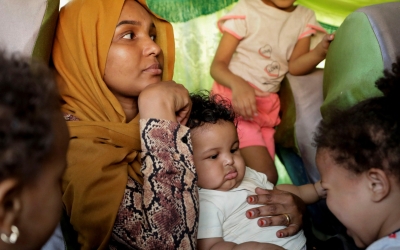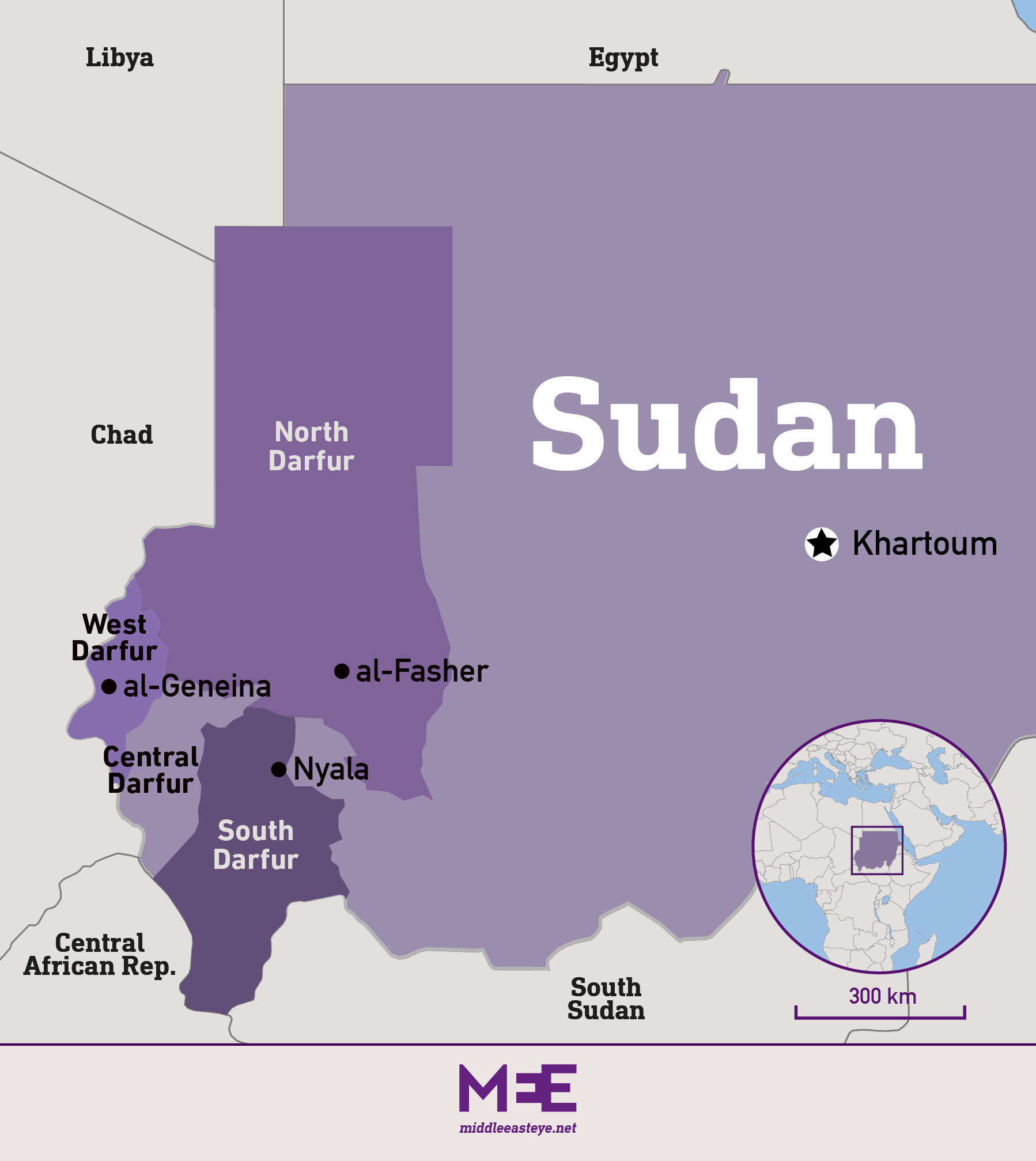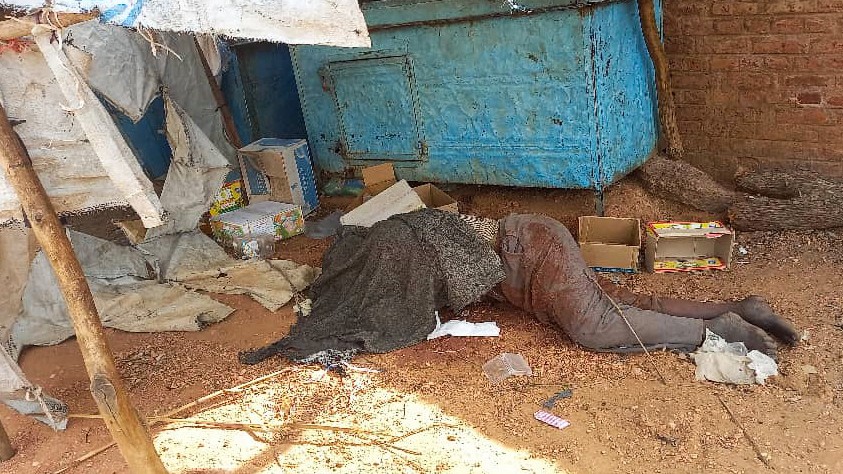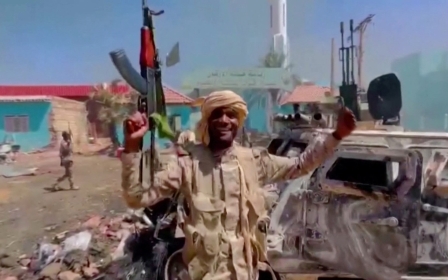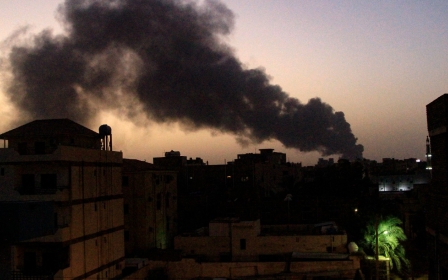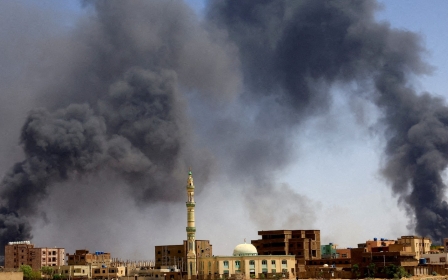In Sudan’s el-Geneina, the dead are left lying in the streets
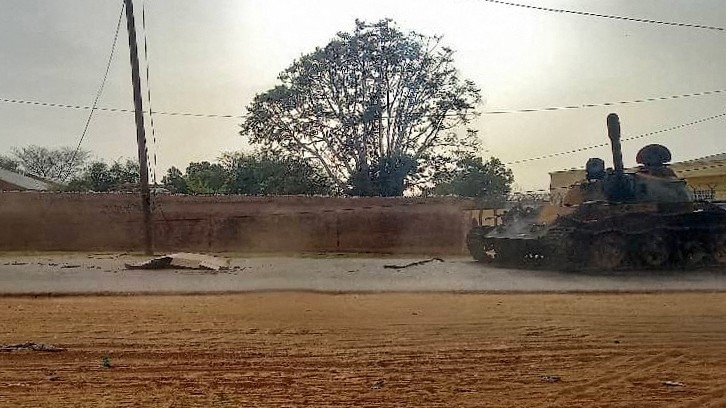
In Sudan’s el-Geneina, the smell of rotting corpses fills the streets. Hundreds of bodies are left decomposing in the West Darfur state capital, eyewitnesses, medics and aid workers told Middle East Eye. The vast majority are civilians.
Middle East Eye spoke to several people who in recent days fled from el-Geneina, where the war in Sudan has reignited vicious ethnic tensions with bloody effect. Contact with those still in the city is near impossible. Communication lines have been cut for weeks as the violence escalated.
An aid worker in el-Geneina, who like many sources wished to remain anonymous for security reasons, told MEE that around 1,500 people have been killed in the town since the war broke out on 15 April. At least 1,000 of those, he said, were women and children.
“So far, we have collected around 700 dead bodies, and double this number are still on streets and inside some houses, but we can’t reach them because of the intensive firing by the militias,” the aid worker said.
“We have seen the corpses decomposing and can smell them rotting. The bodies are scattered randomly everywhere. Unless this situation is sorted soon, this will cause widespread health issues, diseases and more deaths.”
New MEE newsletter: Jerusalem Dispatch
Sign up to get the latest insights and analysis on Israel-Palestine, alongside Turkey Unpacked and other MEE newsletters
The aid worker is a humanitarian veteran. He worked in Darfur between 2003 and 2005, when an ethnically charged conflict between the Sudanese government of then-president Omar al-Bashir and rebel groups killed an estimated 300,000 people. “But I have never seen this before,” he said.
Sudan’s latest war broke out when tensions over a transitional political plan that would have folded the powerful Rapid Support Forces (RSF) paramilitary into the regular military turned violent.
Since then, the capital Khartoum has become a ferocious battleground, as the RSF and Sudanese military fight street to street. Hundreds have been killed over the past 11 weeks and 2.5 million people displaced.
'So far, we have collected around 700 dead bodies, and double this number are still on streets and inside some houses'
- Aid worker in el-Geneina
To the west in Darfur, the war has opened up old wounds. The RSF is made up of fighters that formed the backbone of the Janjaweed, a fearsome collection of Arab militias used by Bashir’s government against non-Arab rebel groups and civilians. Its leader, Mohamed Hamdan Dagalo, the general better known as Hemeti, was a Janjaweed commander.
Across Darfur’s five states, the RSF and Sudanese army have come to blows. But Arab militias allied with the RSF have also joined in the fighting, and in response, some members of the Black African Massalit community have armed themselves - some say after raiding police stores, others after taking weapons directly from the military.
The result in el-Geneina, in particular, has been catastrophic. The RSF and Arab militias are believed to control 80 percent of the city and its surrounding countryside. A small force of primarily Massalit volunteers and ex-rebels hold sections of el-Geneina’s south, while the Sudanese military is defending a garrison in the town’s north.
Killings have been widespread, markets and homes looted, women and girls targeted with sexual violence, and West Darfur’s governor was slain in captivity, in what a war monitor described as an “extrajudicial killing”. The army accused the RSF of killing Khamis ِAbdullah Abakar, who was a former rebel leader, though the paramilitary insists "two outlaws" were to blame.
El-Geneina’s hospital was one of the first locations targeted back in April. Then the pharmacies were looted and destroyed. A second aid worker from the city told MEE that when doctors tried to set up clinics in homes, the militias sought them out and killed people inside.
A medical source, who has been displaced from el-Geneina, said the majority of people recorded killed are from the Massalit community. Arabs tend not to bring their dead to morgues, instead preferring to bury them quickly and quietly, he added, “so, we can’t get any sense of the numbers of those killed in the Arab neighbourhoods”.
Outside the city, Massalit villages have been burnt to the ground, in scenes that echo 2003-2005, when the Janjaweed rampaged through the Darfur countryside.
“We need protection. The Janjaweed will not stop. Even when we leave the whole land, they will come after us. So, we need international protection. There are hundreds of thousands of Massalit who are trapped inside el-Geneina, who cannot get out,” said the second aid worker.
'You slave, we will end you'
Fatima Adam, a 26-year-old from the Massalit community, is one of more than 120,000 Sudanese that have fled Darfur for Chad. She escaped with her family two weeks ago, but her father was killed, and she was forced to leave his dead body behind.
“We were living in al-Zuhoor neighbourhood and we were attacked by the Arab militias from all directions. Shelling destroyed the houses, they came inside the narrow streets, firing on everybody, and the little resistance of the people of our neighborhood failed to stop them,” she told MEE.
“They were wearing RSF unforms, chatting to each other on their way and chanting against the Massalit: ‘You slave, we will end you and expel you from this city’.”
Adam has no idea what has happened to her father’s body.
“It’s very painful that we failed even to bury him. I’m feeling bad and full of shame, but we had no way to do anything else.”
El-Geneina residents told MEE that one important difference to the 2003-2005 war is that this time, the RSF and Arab militias have heavy and advanced weaponry, which they are using on civilians in residential areas.
Adam Mohamed, a 35-year-old merchant, had his shop looted and torched in the early days of the war, along with the rest of the central market. Then the fighters targeted his neighbourhood of al-Thawra.
“What I saw was horrible,” he told MEE. “The shelling was from all directions, people were dying, and in some parts the militias were moving door to door, killing anyone inside.”
Mohamed said some people tried to defend themselves, but the Arab militias came in overwhelming numbers and with more powerful weapons.
“They attacked the houses, destroyed them with bombs, heavy guns and cannons, burnt the entire market, and chanted: ‘Where are you Massalit, where are you sons of dogs’,” he recalled.
Though el-Geneina is not safe, neither is the route out. There are RSF checkpoints all around the city, and even on the open road civilians are targeted as they escape. Bodies line the routes out of the city. One person from el-Geneina told MEE that his family saw two dead children on the road to Chad. The cause of death was unclear.
Last week, Omar Saad fled el-Geneina for Chad with his family. He told MEE the attacks began almost immediately after leaving the city, with dozens of “Arab militia fighters in RSF uniforms” raiding his convoy of vehicles.
“They were shouting aggressively and firing their guns in the air. They ordered all of us to lay down on the ground and started kicking us and hitting us with their guns, insulting us with racist words that I can’t repeat,” Saad said.
According to Saad, the fighters then asked some of the young men in the convoy to stand in a line, before shooting them dead.
“It was a horrible moment. The kids started to cry and the fighters ordered us to silence them or they will kill them too. They even stole the food we took for the road and threw it on the ground in front of us,” Saad said.
The group of fleeing Sudanese were kept lying on the ground for an hour until being allowed to leave. “We drove away so fast, we didn’t even get a chance to look back at the dead bodies we left behind.”
Targeted assassinations
In 2003, the Darfur war broke out when non-Arab communities broke out into rebellion seeking greater autonomy and more investment in the impoverished region. In response, Bashir armed Arab tribes that tore through Darfur villages for three years, killing non-Arab civilians in a war often described as genocidal.
Ibrahim Shmo, a human rights activist from el-Geneina, told MEE that the Arab militias are now again practising ethnic cleansing. Earlier this month, the militias killed Shmo’s father, uncle and grandmother. He says the killings are intentional and systematic.
Most of the people forced from the city are of Black African ethnicity, and Shmo believes the nomadic Arab militias want to take their lands and replace them.
“This is why we have seen the Janjaweed fighters coming from different places to practice this systematic mass killing and genocide. It’s an extension to what happened in 2003, 2004 and 2005 but it’s in a more brutal way this time,” he said.
Massalit leaders have said as many as 5,000 people have been killed, though that number is far higher than other death tolls reported elsewhere.
'This cannot all happen randomly. It was systematic. Systematic from day one'
- Aid worker
The second aid worker from el-Geneina sees a systematic pattern in the waves of attacks. First, the RSF and allied militias cut off communications. Then, they targeted essential services: destroying hospitals, pharmacies and clinics, looting and burning shops and the market, and taking out water and electricity supplies.
“Finally, after that, they moved into the residential neighbourhoods. This tells me one thing: that this cannot all happen randomly. It was systematic. Systematic from day one,” he said.
According to the aid worker, the RSF and its allies have been carrying out targeted assassinations. “It seems they have a list of Massalit figures: community leaders, activists and lawyers. They go to their houses. From the moment they are picked up, no one comes back,” he said.
“Lawyers and community leaders have been Massalit spokespeople. Lawyers are the ones who collect the information and the witnesses and the evidence to make a case in the future at the International Criminal Court or any other court. So, these are the people they wanted to target, so that they can silence them.”
So far, the United Nations' human rights office has called for an "urgent end" to militia attacks on people fleeing el-Geneina.
Volker Perthes, the UN special representative to Sudan, said: "There is an emerging pattern of targeted attacks against civilians on an ethnic basis allegedly committed by Arab militias and some men in RSF uniform. If verified, these attacks could amount to crimes against humanity."
The Rapid Support Forces denied to Middle East Eye that its soldiers were involved in battles in Darfur. It said it did not target hospitals, clinics, power sources, the water supply, or the communications network.
“It is the Sudanese Armed Forces and its backers from the former regime who have engaged in targeted assassinations of lawyers, activists, doctors, and community leaders,” the paramilitary said.
The RSF said none of its soldiers had been involved in the killings and robbing of Sudanese fleeing el-Geneina.
“It is important to distinguish between the actions of the Rapid Support Forces and any other entities involved in the conflict,” it said.
“It is important to recognise that the RSF's actions in facilitating the movement of individuals to Chad were driven by the pressing need to ensure their safety and well-being.”
The spokesperson noted that the RSF’s leader Hemeti had announced “a committee and a field court specifically tasked with addressing any incidents of misconduct or undesirable behaviour within the RSF”.
The RSF described allegations of ethnic cleansing and genocide as “brutal and unfounded”. It said the violence in el-Geneina and elsewhere in West Darfur is the result of various factors, “primarily instigated and perpetuated” by the Sudanese military and its supporters “affiliated with the former regime”.
“Military Intelligence began distributing weapons to the Masalit and Arab tribes, leading to a tribal conflict,” the RSF said.
This article is available in French on Middle East Eye French edition.
Middle East Eye delivers independent and unrivalled coverage and analysis of the Middle East, North Africa and beyond. To learn more about republishing this content and the associated fees, please fill out this form. More about MEE can be found here.


